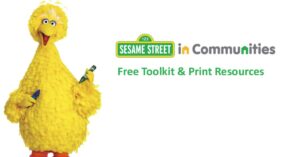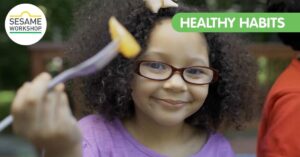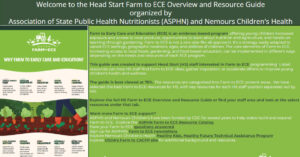Posts Tagged ‘partner resource’
Sesame Street Free Print Books & Resources
Our partners at Sesame Street in Communities want to assist in your support of families and caregivers by sharing free print resources to help children continue to play, learn, and find comfort.
Read MorePower Up with Protein
Protein is a key part of a healthy diet. It helps children grow strong by building muscles, repairing tissues, supporting the immune system, and giving the body energy. Our partners at the Institute of Child Nutrition define protein, highlight its importance, and provide common food sources.
Read MoreHealthy Habits with Sesame Workshop
Our partners at Sesame Street in Communities are working to help families establish healthy habits for children early on to reduce the risk of illness and lay the foundation for lifelong well-being. Their new resources include five videos, one activity book, one storybook, five printable pages, and two articles.
Read MoreFueling Young Minds
Every day, you do more than care for children—you help them grow strong and healthy. One of the best ways to support this growth is by serving nutritious meals and snacks. Our partners at ICN explore how healthy eating supports brain development, learning, and lifelong habits.
Read MorePreventing Lead Poisoning
This Mealtime Memo from our partners at ICN defines lead, identifies lead sources, describes the health effects of lead exposure, explains why children are at risk, and shares important information on how to prevent lead poisoning.
Read MoreHealthy Families
Our partners at Sesame Street in Communities work to support families in raising healthy, happy children. They have developed new resources designed to help parents and caregivers foster strong connections and promote emotional and physical well-being in little ones.
Read MoreDigital Well-being
Our partners at Sesame Street in Communities are helping families build healthy digital habits and make informed tech choices within their unique circumstances. New resources equip parents and providers with practical tools to support children’s development, enhance family well-being, and prepare children to grow up smarter, stronger, and kinder in a digital world.
Read MoreIntroducing Solid Foods to Infants
Infants’ nutritional needs evolve during their first year, and introducing solid foods is crucial in their development. Our partners at ICN provide information to help introduce solid foods smoothly. They cover recommendations for when and how to start, suggest suitable foods, highlight foods to avoid, and provide tips to reduce the risk of choking.
Read MoreHead Start Farm to ECE Overview and Resource Guide
Our partners at the Association of State Public Health Nutritionists (ASPHN) and Nemours Children’s Health are pleased to share the Head Start Farm to ECE Overview and Resource Guide.
Read MoreHappy, Healthy, Ready
Sesame Street for Military Families has launched new resources to encourage healthy habits through engaging and enjoyable activities.
Read More









